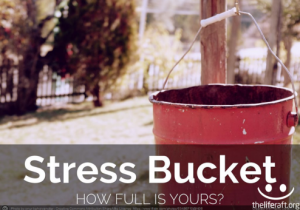The Hidden Dangers Of Workplace Stress

Working life is stressful – you don’t need me to tell you that.
Regardless of what job you do, in any one busy day you face pressures of all kinds. People, technology, traffic, bureaucracy, deadlines and sheer workload all add to the energy-draining frustration of trying to get by in today's busy world. And that’s in addition to the demands we must manage in our private lives – relationships, financial matters, health issues, children, running a home, the list goes on and on.
Like I say, you don’t need me to remind you how much stress these things can cause, but are you aware of the damaging effect this can have on your health?
You see, every time you experience a stressful event or situation you become flooded with what is effectively a cocktail of toxic stress hormones. Over time, the effect of these on your body can be devastating.
Just in case you’re not familiar with the Fight or Flight process I’ll explain it briefly here because it is the very reason why so many of us are suffering from ill-health and why stress is often cited as the number one killer in today’s society.
When your body encounters a threatening situation, an alarm system is automatically set off which prompts the release of a surge of stress hormones, including adrenaline and cortisol. These hormones help prepare you for intense activity – by elevating the heart rate (which also increases blood pressure), and by causing a surge of glucose for energy and by shutting down or suppressing non-essential processes such as digestion.
This all happens automatically, of course, and once the threat has passed, hormone levels, heart rate and various bodily systems quickly return to normal.
The problem is that the alarm system doesn’t distinguish between a real threat and a perceived threat; the same automatic release of hormones is released regardless of whether you are facing a genuine life-threatening situation or just feeling threatened or stressed in some way. In fact, even stressful thoughts – worrying and fretting – trigger the exact same reactions. With our crazy schedules these days we can go for days, weeks months or even years feeling stressed simply because we have so much on our plates and so much to think about.
Battling with traffic on the school run, being late for a meeting, having an argument with a spouse, not having enough money in your bank account to pay the bills this month, washing machine breaking down – or any of the million-and-one other stresses we face as part of our daily grind result in a continual stream of stressful events and feelings making it nigh-on impossible for hormones to return to normal healthy levels.
We’re living in a state of near-permanent tension and anxiety
The constant barrage of pressures and demands and associated worrying, fretting and panicking leaves us in a near-permanent state of tension and anxiety and the more we live like this, the more unhealthy and unhappy we become.
When you consider the effect of stress hormones on the body – increased blood sugar, raised heart rate, muscle tension and shut down of non-essential systems and organs – it’s no wonder that so many of us today are suffering from stress-related illnesses and complaints. High blood pressure, heart disease, ulcers, strokes, migraines and irritable bowel syndrome are well-known stress-associated problems but it is now believed that almost ALL illnesses can be attributed to stress in some way.
And when you consider the knock-on effects of chronic health complaints – irritability, obesity, social withdrawal, insomnia etc. it’s easy to see why people become unhappy and depressed and why stress is widely cited as the number one killer in the modern world.
Our coping strategies don’t work
Many of us cope with stress and the problems it causes through various forms of DISTRACTION. We try to take our minds off things by immersing ourselves in other activities. We go out, we drink, we buy things, we eat things and generally do what we can to ignore or avoid the pains we’re facing. But avoidance can only work for so long and only leads to further problems down the line. The simple analogy of a ‘Stress Bucket’ can be used to explain this…
As you go through your working day, each and every time you experience a difficult, worrying or annoying situation, thought or feeling, stress gets added to your stress bucket.

And the more stress you have in your bucket, the more tense, frustrated, unhappy and ineffective you’re obviously going to feel.
You can guess where this is going – eventually, the level of stress gets to the point where even the smallest additional pressure will cause your stress bucket to SPILL OVER. And this is obviously when things start to go wrong. This is when we start to make mistakes through our inability to focus and concentrate. It’s when we shout more than we communicate. It’s when we hit out at those we love. It’s when we spend most of our waking hours wondering how we ever got into such a mess. It’s when the tears start to flow.
Without a safe, reliable way of both letting some stress out of your bucket, and preventing too much additional stress getting in, avoidance can only lead to a continual build up of pressure. And over time, being overloaded with stress like this can lead to serious problems…
…depression, illness, burnout and breakdown.
According to the Health and Safety Executive in the UK stress is now the biggest cause of sickness in the UK with up to five 5 million people ‘very’ or ‘extremely’ stressed through work. It is estimated that as many as one in four will experience some kind of mental health problem in the course of a year.
Would you like to learn how to empty your stress bucket?
Maybe you can relate to some of this. Maybe you’re carrying an overloaded stress bucket around with you and badly need to lighten the load. The very fact that you’ve read this far would suggest that some or all of these issues are of concern to you.
Well, I have some good news.
Having spent most of my adult life as what can best be described as ‘a total stress head’ I can vouch for the effectiveness of a certain scientifically proven, psychological tool. Learning this has changed my life beyond belief and it can change yours too. The technique – which you’ll already know about if you’re a regular reader of our blog – is a particular form of awareness called mindfulness and it can be practiced through meditation and other activities.
This technique can help you stay healthy, calm and happy no matter how stressful your work or life is. It can help you sleep soundly and relax deeply. It can make you more productive and more focused. And it can put you in a state where NOTHING can bother you.
Sound good?
If you’re interested in learning mindfulness meditation for yourself, you’ll find articles and resources on this website. Or you can do a quick Google search for the terms ‘learn mindfulness’ or ‘learn to meditate’. There are all kinds of courses and resources widely available and the technique is very simple to learn. The key to success, however, comes down to two words – ‘regular practice’ – and in that regard, a course with an element of accountability, and peer support, together with a teacher on-hand for guidance, is the best way to learn.
If you can’t find such a course in your local area, we now offer a live, online version of our Quiet Mind course which we teach over 6 weeks. The course includes live and recorded tuition, a peer support members’ group and a live Q and A session. Each tutorial session lasts 1.5 hours and is recorded so that those who miss it can still access the materials. Students have access to the materials for one year although once learned, the technique is a tool you can use forever to improve all areas of your life.
You’ll find more information on this program here: Learn Mindfulness Meditation. If you have any questions, you can contact me HERE



